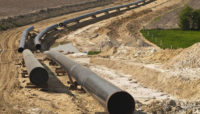Energy Construction
Feds Approve $950M Pa.-NJ Gas Line Expansion, Despite State Caution

Proposed gas pipeline and compressor station expansion and upgrade project in Pennsylvania and New Jersey gained federal energy agency approval Jan. 11, but opponents now seek a rehearing.
Image Courtesy Transco
Opponents of a $950-million natural gas pipeline system expansion in Pennsylvania and New Jersey will ask the Federal Energy Regulatory Commission to reconsider its Jan. 11 approval of the project, noting one state's earlier argument that the added capacity is not needed.
The pushback follows commissioners’ unanimous decision to permit the project, called the Regional Energy Access expansion, which would add 829,000 dekatherms a day to the existing Transco pipeline owned by Williams Co. that transports Marcellus shale gas to customers in Pennsylvania, New Jersey and Maryland.
Under the plan, 22.3 miles of 30-in. pipeline would be added in Luzerne County, Pa. and 13.8 miles of 42-in. loop in Monroe County, Pa., with a new compressor station in Gloucester County, N.J., and upgrades to existing ones in the states served.
The system is part of a 10,000-mile pipeline system between Texas and New York City that transports about 15% of U.S. natural gas, says Transco.
Last year, New Jersey's Board of Public Utilites and its rate counsel had told FERC that based on a study it commissioned, along with its aggressive transition to renewable energy, the added gas capacity was not needed through 2030.
In its filing to FERC, Williams Co. said the project has support from regional utilities such as PSEG, will maximize use of existing infrastructure and be built “in a manner that is adaptable to future renewable energy sources like clean hydrogen and renewable natural gas blending." The project's final environmental impact statement was issued last July.
The FERC approval “represents an important milestone for the Regional Energy Access expansion," said the developer. We look forward to continuing our work with regulators and other stakeholders.” The firm did not respond to ENR’s query on contractor selection status for the anticipated construction.
In their approval, commissioners noted that New Jersey's data on capacity did not apply to out of state customers.
FERC Commissioner James Danly (R) also took issue with FERC allowing “late intervention” by New Jersey officials and with a 30-day hold on the approval effective date, to give landowners time to appeal, noting impact on the construction schedule. The developer had anticipated having the new capacity on line for the 2023-2024 winter season.
But in her approval, Democrat Alison Clements faulted current FERC approval parameters for not "considering evidence pertaining to project need today, in 2023," noting that "a combination of market forces and federal, state, and local climate protection policies may lead to flat or declining demand for natural gas over time." She added that "circumstances impacting the need for new pipeline capacity are an order of magnitude more complex than they were in 1999, but our policies and practices have not evolved to address that complexity."
According to Clements, "the Commission’s relatively superficial approach to evaluating project need will become increasingly untenable, both legally and practically."
Taylor McFarland, conservation program manager for the New Jersey Sierra Club, urged the state to join the motion for a FERC rehearing, saying that "expansion of more fossil fuel projects like the [expansion project] will make it more difficult ... for New Jersey to meet its [greenhouse gas] emission commitments.” The project has yet to receive a state environmental permit.
A spokesperson for Gov. Phil Murphy (D) said the administration “will continue to evaluate its options,” although he said the governor "continues to stand by the findings of the BPU and Rate Counsel, which were shared with FERC.”
The project was a competitor to the $1-billion PennEast gas pipeline that its developer cancelled in 2021, citing permitting difficulties in New Jersey.




